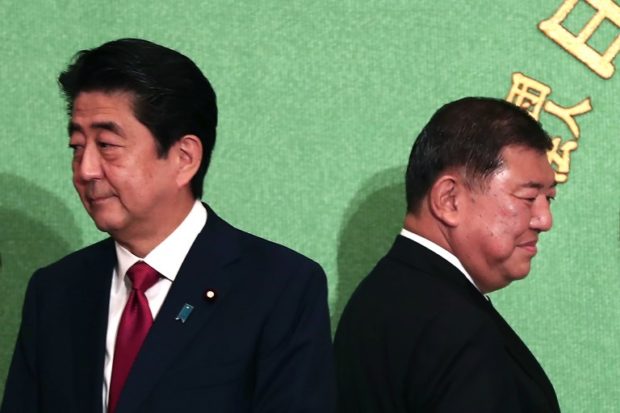Japan’s battle for PM: military geek vs political blueblood

In this file photo taken on September 14, 2018 Japan’s Prime Minister Shinzo Abe (left) speaks during a debate for the Liberal Democratic Party (LDP) presidential election with former defence minister Shigeru Ishiba (right) at Japan National Press Club in Tokyo. AFP
TOKYO, Japan — Thursday’s election for the head of Japan’s LDP party — and by extension prime minister — pits a political blueblood aiming to become the country’s longest serving premier against a military expert with a penchant for karaoke — and UFOs.
Shigeru Ishiba: ‘military geek’
Considered a “military geek” for his expertise in security issues, Ishiba, 61, is a self-confessed karaoke lover who once got embroiled in a bizarre debate about the existence of flying saucers.
Like his rival, current premier Shinzo Abe, the former banker is known as a strong orator, and got into politics early, winning a parliamentary seat at the age of 29.
Also like Abe, Ishiba is a defence hawk who wants to cement the country’s Self-Defense Forces into the constitution.
At the height of tensions with North Korea, he even mused whether Japan— the only country to have suffered an atomic attack— should reconsider its policy of forbidding nuclear weapons on its soil.
He has served in key posts under Abe and was defence minister in 2007 where he won plaudits for his knowledge of military affairs.
Article continues after this advertisementIshiba said he was running to “restore confidence in the government, which should be at the service of citizens”— a clear dig at recent scandals afflicting Abe.
He also voiced amazement that no one was running against Abe, who beat him in the 2012 LDP leadership race.
In 2007, as defence minister, he became embroiled in a bizarre debate about aliens, saying there were “no grounds for us to deny that there are unidentified flying objects (UFOs) and some life-form that controls them”, stressing the need to simulate defense against them.
He later clarified this was his personal view, not the official government position.
Shinzo Abe: pragmatic nationalist
The hawkish Abe, 63, whose grandfather and father both held power, is hoping to write his own name in the record books as Japan’s longest-serving premier.
Groomed for power from birth, he is sometimes criticised as arrogant, but has also shown a self-deprecating sense of humour, dressing up as video game character Super Mario at the 2016 Rio Olympics to give a zany preview of Tokyo 2020.
A shrewd diplomat, he was quick to cultivate a relationship with US President Donald Trump, famously visiting him in Trump Tower before the tycoon was even sworn in.
And he has also cozied up to Russian President Vladimir Putin and tried to heal ties with China, while pushing a nationalist agenda at home.
He saw off a surprising challenge from Tokyo governor Yuriko Koike to romp to victory in 2017 snap elections and proved remarkably resilient during weeks of scandal earlier this year that sapped his popularity.
Nationalist Abe has at times infuriated neighbours still scarred by Japan’s war-time military aggression and his stated dream of reforming the constitution to clarify the role of the military is viewed with deep suspicion in the region.
He joined Kobe Steel two years after graduating but after three more years turned to politics, becoming a secretary to foreign minister Shintaro Abe, his father, and eventually becoming the country’s youngest prime minister at 52. /ee